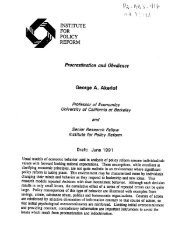FAMILIAL ADAPTATIONS TO THE INTERNATIONALIZATION OF ...
FAMILIAL ADAPTATIONS TO THE INTERNATIONALIZATION OF ...
FAMILIAL ADAPTATIONS TO THE INTERNATIONALIZATION OF ...
Create successful ePaper yourself
Turn your PDF publications into a flip-book with our unique Google optimized e-Paper software.
-9-<br />
Most of the money that migrants have remitted to their home<br />
countries remainder has of been<br />
the used<br />
migrants' to<br />
savings increase household usually consumption been ... The<br />
has devoted<br />
financing some personal project. Typically, little or to<br />
none of<br />
migrants'<br />
the<br />
savings has been invested in capital generating<br />
activities (UN 1982:42).<br />
In Egypt, a "coi,sumer craze" rather than productive investment<br />
predominates; a low level of domestic capital formation is maintained<br />
despite increased individual savings. The anticipated "development" has<br />
turned out to be nothing more than a housing boom in both urban and rural<br />
areas, a related rise in land values, encroachment on agricultural land for<br />
non-agricultural exploitation, increased mechanized agriculture and<br />
transportation in the rural areas, as well as increases in small-scale<br />
commercial enterprises, the province of informal sector family labour.<br />
Not only have migrant remittances not contributed to productive<br />
investment, they have in fact aggravated local inflation (Abdel<br />
1980).<br />
Fadil<br />
While there is no doubt that migrant remittances are not the<br />
source<br />
only<br />
of inflation in Egypt, it is also certain that these remittances,<br />
related labour<br />
and<br />
shortages, fuelled inflation through increased buying power<br />
of returning igrants or their resident families, through increases<br />
of<br />
of costs<br />
production (related to labour shortage), and through<br />
demand<br />
the increasing<br />
for imported consumer goods, which has affected the devaluation of<br />
Egyptian currency (Gabaly 1983:90-91).<br />
In sum, the European experience of primitive accumulation<br />
migration during<br />
through<br />
the mercantile phase of capitalist development has not<br />
replicated<br />
been<br />
for Egypt. Accumulated savings have not been transformed into<br />
capital for industrial development.<br />
As for the anticipated "political stability" as a correlate of<br />
exodus,<br />
labour<br />
one cannot ignore the increasing disparities in<br />
increasing<br />
income and<br />
potential<br />
the<br />
for social unrest (Abdel Khalek 1981:407). In<br />
within<br />
fact,<br />
the framework of the ODEP, the Sadat government anticipated<br />
social<br />
such<br />
unrest and was prepared with appropriate repressive legislation.<br />
#90, which<br />
Law<br />
was issued in May 1980 under the title "Law for the Protection<br />
Values<br />
of<br />
from Shame," illustrates the linkage between the Egyptian<br />
economic<br />
regime's<br />
policies and political repression. This law, which legalizes<br />
most blatant<br />
the<br />
forms of repression, was described by Sadat as necessary<br />
because Egypt was, in his words,<br />
... entering into a new stage of development in which<br />
receive<br />
it wou',d<br />
billions of dollars and the executive authority must be<br />
spared the burden of having to deal with political malcontents<br />
(Sadat as cited in Jabara 1981).<br />
In .light of such repressive laws and the decline of state<br />
responsibilities in favour of "market forces" and individudl and family<br />
solutions to economic crises, the prediction of political stability is<br />
questionable.
















